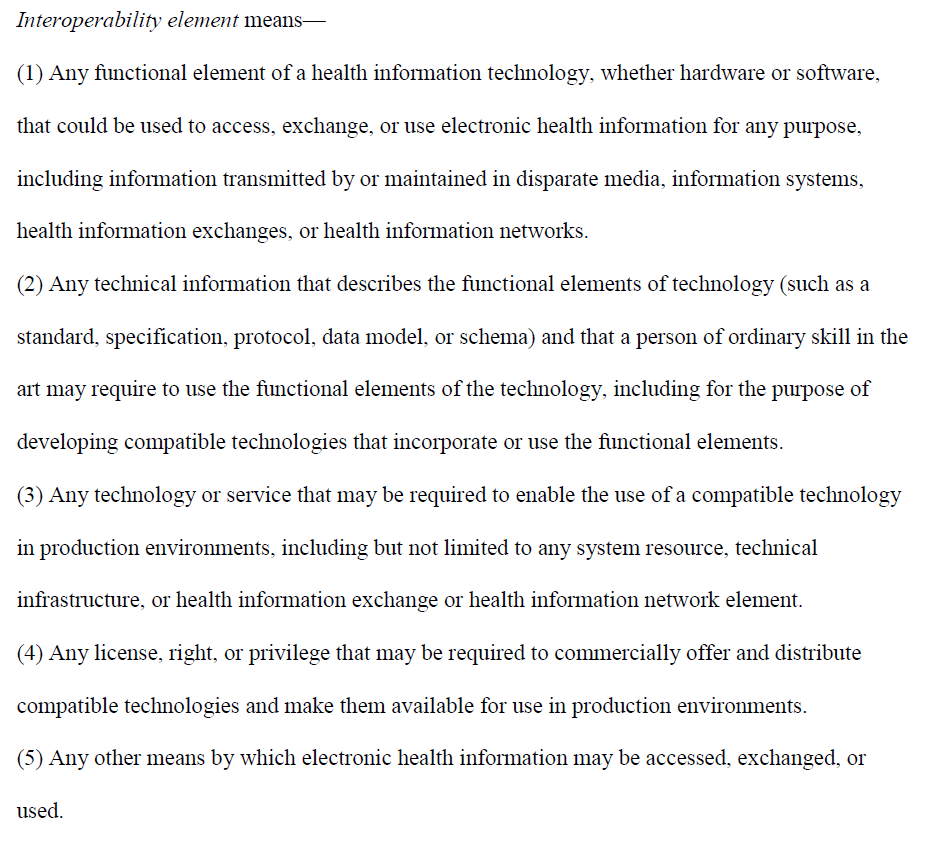And MA providers have to participate in a trusted exchange where they can exchange this data.
enforced by the health IT developer" is the exact wording) in #NoBlocking and new contracts wouldn't have them. More later..
Real world testing ensures that information flow actually works.
establishes such program, we will undertake rulemaking to propose and implement the associated Condition and Maintenance of Certification requirement(s) for health IT developers" #NoBlocking #ThreeReams?
1. clearly promote public confidence (e.g., privacy, security, patient safety) or competition & innovation
2. enable precautions & maintenance to continue without fear of it being called "Blocking"
3. be reasonable & necessary
1. promoting public confidence
2. promoting competition and consumer welfare
3. promoting the performance of #HealthIT
1. patient safety
2. patient privacy
3. security of Electronic Health Information (EHI)
are permitted under #NoBlocking
1. recover reasonable costs,
2. excuse an actor from infeasable requests
3. permit licensing of technology on reasonable and non-discriminatory terms
are permitted under #NoBlocking
Speaking as an informed patient, I've seen a LOT of EHRs in use, and sadly, there's little earth shattering to look at
Statutory Interpretation and API Policy Principles: This is aboput @ONC_HealthIT's interpretation of the "without special effort" quote in Cures. API users are who exert special effort or not
standardized = same tech capabilities
transparent = freely available documentation
pro-competitive = vendors don't decide on access
Frankly, that fits under #NoBlocking, because if you have to spend three days finding your doctor's endpoint, that's special effort. Been there, done that: motorcycleguy.blogspot.com/2017/08/whats-…
So, that is a very clear statement from @ONC_HealthIT about aspects of program conditions existing today that says "be careful" b/c "API Data Providers" are who "provides access via the API technology to data it produces and electronically manages"
A lot of organizations realize that patient data is a commodity, and are thinking about how to capitalize on it.
Patient Data "Haves" can't hold it over the "have nots"
Furthermore, "claim" is not "limited, in any way, to a specific form, format, or submission approach or process"
It's an either/or question, if you read my last non-regulatory post, you know my answer. Yes -- whichever is longer. #NoBlocking
DirectTrust is a self-proclaimed "Framework that comprises technical, legal, and business standards that members of the DirectTrust community agree to follow, uphold, and enforce."
Me: Yes
Is it broad enough, or too broad.
My gut is that this is baby bear's definition (just right), but I'm still evaluating.
[HELL YES!]

• A health system incorrectly claims that the HIPAA Rules or other legal requirements preclude it from exchanging EHI with unaffiliated providers."
Oh please give me that hammer!
With that, it's time for those under the watchful eyes of @ONC_HealthIT and @OIGatHHS to get a music break:
"In addition, any remedy sought or action taken by HHS under the information blocking provision would be independent from the antitrust laws and would not prevent FTC or DOJ from taking action with regard to the same actor or conduct"
1. be directly related to the concern (of security or privacy)
2. be tailored to the specific issue being addressed
3. be implemented in a consistent and non-discriminatory manner
...
that's "Information Blocking" #NoBlocking
1. Non-standard design or implementation choices
2. subjective (e.g., intangible assets depreciation or loss of value) or speculative costs (opportunity costs)
I cannot even begin to parse that last one. #NoBlocking

Arguably, that there should be some rationale in this section that addresses requests going beyond what is readily available in standards
use interoperability elements = license IP
1) response to a request and making an offer
2) RAND terms
3) degrading or impeding use
4) compliance with certification
By definition, that's EHI
"actors are not required to seek the protection of this (or any other) exception. If an actor does not want to license a particular technology, it may choose to comply with the information blocking provision in another way, ..." #NoBlocking



